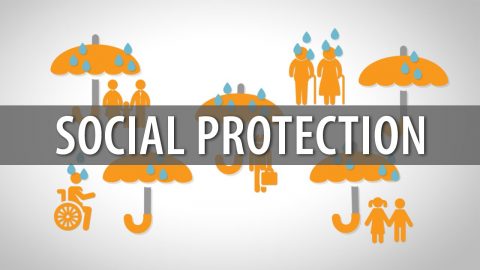NATIONAL SOCIAL PROTECTION POLICY
The Social Protection Policy for Nigeria is an umbrella policy framework that incorporates related social agenda paradigms intended to reduce poverty and provide a life of dignity for all citizens.
Social protection is a multi-sectoral and multi-disciplinary approach that contributes to poverty reduction, articulating policy priorities of government towards sustainable development. It is in this context that the Ministry of Finance, Budget and National Planning, (Budget and National Planning arm) the coordinating organ of all projects, programmes and policies of government, was given the task to anchor the revision of the National Social Protection Policy with the active participation and contribution of all stakeholders in both public and private sectors at the federal and subnational levels. It is, therefore, a national policy derived from national consultation and consensus. The policy document was enriched by inputs from an array of professional and technical experts and institutions, especially the Social Development department in the Ministry, the Nigerian Institute of Social and Economic Research (NISER), as well as the leadership provided by the top management of the Ministry.
Nigeria’s increasing population and widespread poverty necessitated government’s concern for concerted efforts to address poverty issues in the country in order to reduce the scourge of poverty and improve the general well-being of all Nigerians. The policy seeks to pursue this through enhanced reduction of inequality and inequity as well as the provision of social incentives. This is imperative to foster human-centred approach to development so as to enhance investment in human and social capital. Development through good health and education, good governance including sound macro-economic milieu, among others, are essential for the promotion of inclusive growth, equality, security and a life of dignity.
Both the federal and state governments, in different scales and at different dimensions have been implementing social protection projects and programmes to cushion the effect of poverty in their domains. But the absence of an effective coordination and collaboration mechanism has increasingly gained importance as a source of concern. Though the various social protection programmes have yielded some results, a greater degree of achievement is possible with more deliberate, concerted and programmatic actions guided by an umbrella policy.
In producing this policy, state-wide consultations were embarked upon to harness and harvest ideas of all stakeholders through publicized workshops in all the geo-political zones and focused group discussions. This process enlisted assurance of a people-centred policy with the commitment of both the executive and the legislature.
The Federal Government will continue to count on the support of all partners in the implementation of this policy. By and large, the policy will facilitate reversal of the pervasive and persistent poverty and improve the living standards of all members in the society. The policy builds on existing institutional and programmatic efforts of all tiers of government and hopes to consolidate on-going approaches and strategy-oriented interventions that will propel tracking of key performance indicators and targets. The primary responsibility for implementing the policy will be that of all tiers of government with the active support of the private sector, including the civil society organisations.
In conclusion, the policy invites government at all levels, national and sub national legislatures, the private sector, the civil society and the international community to provide support for it within the context of national development goals.
The production of this policy document benefited significantly from support from Save the Children, UNICEF, ILO, WFP, UNDP, and the World Bank. The contribution of MDAs, at the Federal and State level, academia, CSOs, stakeholders and the international community are duly acknowledged.
Prince Clem Ikanade Agba
Minister of state, Budget, and National Planning
Please, click below to download the full document.
Revised New NSPP_191021
